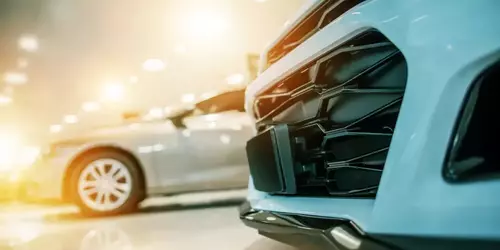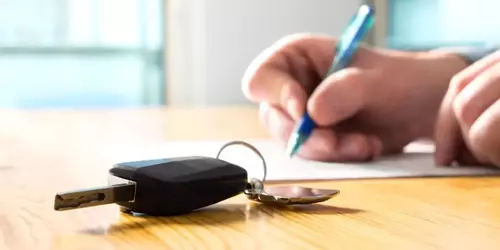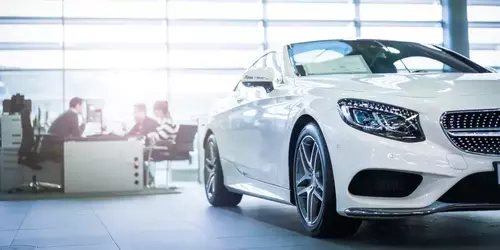What is PCP Car Finance? PCP Car Finance Explained
- An overview of PCP car finance
- Associated costs
- Top tips
When it comes to vehicle finance, Personal Contract Purchase (PCP) is the most popular way of financing a car. Somewhere in the region of 80% of new cars have been bought using PCP. It’s rare to be able to buy a vehicle outright, especially without a loan, so this is one of the ways that makes it easier to drive away in a new car.
While it may seem somewhat daunting, PCP car finance isn’t that hard to get your head around. We’ll take away the confusion by explaining the process in detail each step of the way.

What's On This Page?
Click the links below and head straight to a specific section of the article.
PCP Finance Overview
Essentially, PCP car finance is where you borrow the car over a course of three to five years and you have the option to buy or return the vehicle at the end of the agreed period.
If you do return the vehicle, you have the option to start another PCP car finance deal on a new car, meaning you can drive a brand new car every three years or so. Alternatively, you can return the car and not have to pay any further costs associated with it.
Associated Costs with PCP Car Finance
You don’t actually pay for the cost of the vehicle during PCP finance. You’re essentially only covering the cost of the depreciation during the length of your agreement. The dealer sets a Guaranteed Minimum Future Value (GMFV) at the start and this is how much the car is assumed to be worth at the end of the agreement. This is how much you’ll pay for the car at the end (if you wish to), minus any deposit already paid. Alternatively, if the car is worth more than the GMFV, the difference can be put towards a deposit on another PCP car finance deal.
PCP Finance Example
As a simplified example, let’s say a car costs £20,000. Its GMFV is estimated to be £10,000 at the end of the PCP car finance agreement. The deposit was £2,000, the monthly payments add up to £18,000 and the final balloon payment is £8,000.
If we break it down into percentages, you can see that the car’s GMFV is 50% of the total value, 10% is the deposit and a further 40% is the balloon payment at the end.
The monthly payments and the deposit make up the original value of the car, but even when you’ve reached this value, you won’t own the car. Because of the way PCP car finance works, the monthly payments only cover the depreciation of the value of the car during its term of use. It’s a loan, not a lease.
In this instance, the car is now worth £10,000, but since you’ve already paid a £2,000 deposit on it, the final payment (or balloon payment) is £8,000. If you wish to keep the car at the end, this means you’ll have paid £28,000 for a car worth £20,000. In reality, this will be higher as there may be other costs included in the PCP car finance deal.
The £18,000 in monthly payments is the loan that you’ve borrowed from the value of the car during its use, as agreed by the dealer. While you can increase the deposit you pay, the monthly payments will be lower, but you will be paying the same amount over the course of the contract as if you had a smaller deposit. In this instance, paying a bigger deposit will make the balloon payment at the end of the PCP car finance smaller.
Most people can’t afford the final balloon payment, but will take out a new PCP car finance deal so they feel as though they haven’t wasted the investment during the whole process.
PCP Car Finance Process
The process consists of the following steps:
Pass a credit check
Pay an upfront deposit
Three to five year agreement, permitting use of the car
End of contract
When the contract comes to an end, there are three options available to you.
Return the car
Pay the resale value and keep it
Use the resale value towards a new PCP car finance deal
Credit Check
The credit check is the first hurdle. It’s an assessment to make sure you can afford the PCP car finance in full and to also ensure there’s no risk of not keeping up repayments. This could include future costs, such as buying a house in a couple of years’ time, which would make payments more difficult.
Your credit rating often dictates how much interest you’ll pay, but because the market for PCP car finance is so competitive, there are often deals you can get without any interest.
Deposit
This is usually 10% of the price of the car. You can always pay more, but it’s important to understand how this affects the rest of your PCP car finance.
Paying a larger deposit decreases your monthly payments. It also means that the balloon payment will be lower if you’re considering buying the car at the end of the agreement. If you already know that you won’t be buying the car on termination of your PCP car finance, paying a larger deposit may not be worth your while.
Paying a smaller deposit may be more beneficial because it can give you greater flexibility if your situation changes. You are able to end a PCP car finance deal early, but only if you’ve already paid half the value of the vehicle, which will be easier to do with higher monthly payments. This could help if a better car comes along and you don’t wish to wait for it.
PCP Car Finance Use
Before you use the car, you’d have signed an agreement with the car dealership. Make sure you’re aware of how long the agreement will last and how you’re expected to look after the car. You could invalidate your PCP car finance deal if you don’t get it serviced using the manufacturer, but this will be specified in the contract.
While you don’t own the car, you’re permitted to use it during this time. Your PCP car finance agreement will consist of a yearly mileage restriction, which you mustn’t exceed. You’ll be expected to maintain the vehicle in good condition, keeping up monthly repayments and make sure you take out comprehensive third party insurance.
If you don’t keep up your monthly payments, you will have to give the car back.

End of Agreement
When the PCP car finance comes to an end, you’ll go through an assessment of the car, and any costs are calculated. This will include any damage to the vehicle and any extra charges for additional mileage (usually 5-10p per mile, but can be up to 72p in some cases), which will impact the value of the vehicle.
If you don’t wish to buy it or don’t want to take out another PCP car finance deal, the process has come to its end and you owe no more money.
If you wish to keep the car, you will pay the current cost of the vehicle minus the deposit. Some dealers will allow you to refinance the car over several more years if you can’t afford the final payment, but this will cost you longer in monthly payments, with additional interest.
If you wish to change your vehicle by taking out another PCP finance deal, you have the option of using the difference in car value against the GMFV to put towards a new deposit. The GMFV is usually set at a level lower than the actual value of the car to make it easier to take out another PCP car finance deal.
The only drawback to this is that it’s incredibly hard to use the difference in value against another car manufacturer. They’re usually only available with the same dealer. If you wish to change dealer, you may end up being out of pocket as you’ll have to pay for another deposit instead.
Voluntary Termination
If you wish to end or cancel the agreement of your PCP car finance early, you have every right to do so under the Consumer Credit Act, providing you have paid half the value of the vehicle. If not, you’ll have to pay the difference.
PCP Car Finance Tips
Make sure you check your contract’s terms and conditions and you’re fully aware of what’s required of you. Make note of any fees charged for any reason and if you’re allowed to change the agreement at a later date
Make sure you’re clear on how much you’re paying. This will be less than other types of car finance. Hire Purchase (HP) plans cost more per month, but PCP has a balloon payment
Check the mileage and what the fees are for exceeding it. If you’re driving more miles than anticipated, talk to your dealer to alter the agreement rather than waiting to pay a large fine
It’s a good idea to ask for written examples of what counts as excessive wear and tear and damage. This way, you shouldn’t be hit with any surprise deductions
New vehicles often lose a lot of their value after they’ve been bought. It’s a good idea to take out guaranteed asset protection (GAP) insurance to pay for any accidental damage to the vehicle
Pros |
Lower deposits |
Lower monthly fixed repayments than HP |
Flexible options |
Able to get a highly desirable car for less upfront cost |
Can potentially drive a new car every three years or so without a full deposit |
New car warranties run for three years, so you’ll always be covered if you take out another PCP car finance deal |
Competitive market, so you can get good deals (like 0% interest) |
Cons |
Monthly repayments don’t count towards car ownership |
Massive balloon payment can be unaffordable |
Sense of commitment with often nothing to show for it at the end |
Not easy to use any accrued deposit with another car manufacturer towards another PCP car finance deal |
Not recommended if you wish to leave early as it may cost you more |
Credit for car finance has grown faster than household incomes |
To learn more about mis-sold PCP car finance and claims, read here.












